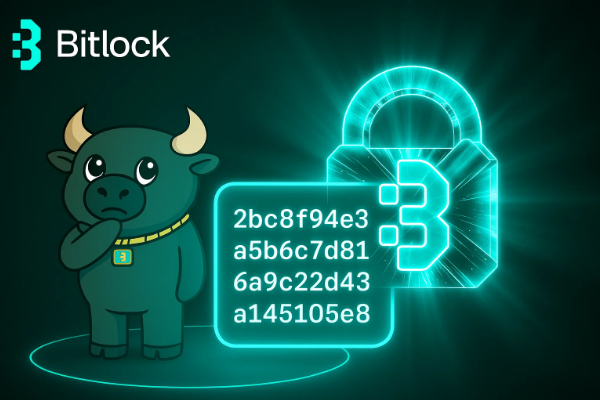Most crypto users still don’t understand what a cryptocurrency address really is. Many send funds to the wrong chain, lose access, or expose private information because they treat their address like a simple bank account number. In reality, every address is a cryptographic identity and without a secure tool like Bitlock Wallet, one mistake can cost everything.
With the rise of multi-chain platforms and cross-network swaps, the risk has only increased. Using a custodial wallet or exchange often means someone else controls your address and private keys. That’s how users lose coins in exchange hacks or during withdrawals.
A non-custodial wallet like Bitlock Wallet puts you back in control. Your address, your keys, your crypto secured locally and never shared with servers. In this guide, you’ll learn exactly how cryptocurrency addresses work, how to use them safely, and how Bitlock simplifies this process across all major blockchains without requiring KYC.
What is a Cryptocurrency Address and How Does It Work?
A cryptocurrency address represents the digital point where you send, store, and receive crypto assets. It functions like an account number, but instead of a bank creating it, cryptography generates and secures it with complex mathematical algorithms. Each address connects to two keys public and private that define ownership on the blockchain.
When you create a wallet, your public key is transformed into an address, usually a long string of letters and numbers (for example, on Ethereum it starts with “0x”). This address is what others use to send you funds. The private key, on the other hand, acts as your digital signature; it authorizes transactions and proves you are the rightful owner. Losing the private key means losing access permanently. You can read more about this in this article.
Every transaction involving your address is recorded on the blockchain, a transparent ledger that verifies ownership and prevents double spending. Once confirmed by the network, the data becomes immutable. Unlike traditional financial systems, there’s no intermediary to reverse or edit entries.
Modern non-custodial wallets like Bitlock Wallet automate this process without ever storing your keys on external servers. All encryption, signing, and verification happen directly on your device. That means even if Bitlock’s servers went offline, your crypto remains fully accessible and safe.
How is a Cryptocurrency Address Generated in a Non-Custodial Wallet?
A cryptocurrency address is generated through a process based on advanced cryptographic algorithms, ensuring that every address is unique, secure, and mathematically linked to its private key. In non-custodial wallets, this generation happens locally meaning only the user’s device creates and stores the keys, never the company’s servers.
When you create a new wallet in Bitlock Wallet, the app applies cryptographic standards like ECDSA and SHA-256 hashing to build your public-private key pair. It then derives your public address from that pair. Your device encrypts and stores the private key locally, while the app compresses and encodes the public key (for example, in Base58 or Bech32 format) to display your visible crypto address.
This design guarantees that even Bitlock.ai cannot access your keys or recover them for you; it’s the essence of a non-custodial system. Every signature you make to confirm a transaction is performed locally on your device, without transmitting sensitive data over the internet.
Bitlock takes this further by supporting multi-chain address generation. You can create and manage addresses across networks like Ethereum, Polygon, BNB Smart Chain, Base, and Solana all from one interface. Each chain uses its own address format, yet Bitlock automatically recognizes and displays them correctly, making cross-chain management effortless.
Can we run out of crypto addresses?
No, we can’t run out of cryptocurrency addresses, not even close. The number of possible addresses is astronomically large, thanks to the way cryptography works.
Most blockchains use 256-bit encryption, meaning there are 2²⁵⁶ possible private keys. That’s about 10⁷⁷ combinations a number so big it exceeds all atoms in the observable universe. Even if every person on Earth generated billions of new addresses every second for millions of years, we’d still barely make a dent.
Each Bitlock Wallet user generates unique addresses locally on their device. Since there’s no central database and every address is mathematically random, collisions (two identical addresses) are practically impossible. The probability is so low that it’s considered zero for all practical purposes.
In simple terms: crypto addresses are infinite for human use. You can create new ones anytime for better privacy or organization and wallets like Bitlock make that process automatic and secure.
How Safe Is My Cryptocurrency Address in a Non-Custodial Wallet?
Security is the main advantage of using a non-custodial crypto wallet. In this setup, only you hold the private keys that control your cryptocurrency address. No company, exchange, or third party can move your assets without your approval.
In Bitlock Wallet, all cryptographic operations happen locally on your device. Your Secret Recovery Phrase and private keys are never stored on Bitlock’s servers, cloud systems, or shared across networks. They are encrypted using modern standards like AES-256 and hardware-level key protection, meaning even if your phone is compromised, your keys remain inaccessible without your PIN or biometric verification.
Bitlock also adds several privacy and safety layers that typical wallets lack:
- Local confirmation: Every transaction is signed inside the app, ensuring no external server can intercept or modify it.
- Optional biometric access: You can protect your wallet with Face ID or fingerprint authentication.
- Hide balance mode: Lets you mask your holdings in public or while screen-sharing.
- Multi-chain protection: Each network operates independently, reducing exposure if one chain experiences a vulnerability.
Final Thoughts – Why Bitlock Wallet Redefines Ownership
Bitlock Wallet redefines what it means to truly own your crypto. It’s non-custodial, meaning your keys and your assets stay fully under your control. Unlike centralized wallets that hold user data and require identity verification, Bitlock keeps everything local, private, and anonymous.With no KYC, multi-chain support, and the lowest swap fee of 0.75%, Bitlock makes decentralized finance fast, accessible, and rewarding. Every transaction you make helps fuel the ecosystem, returning value to users through rewards and community incentives.


